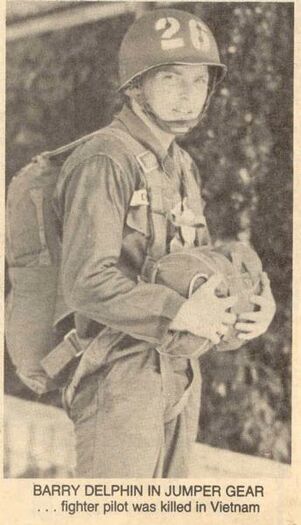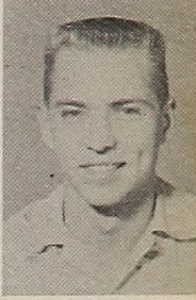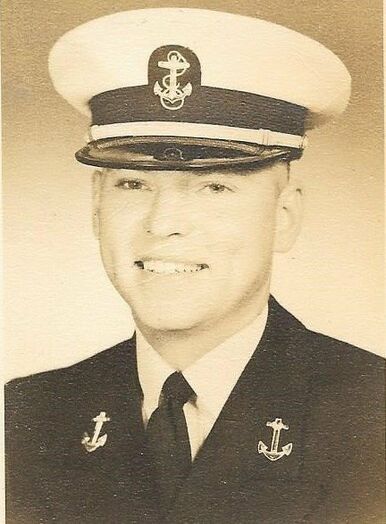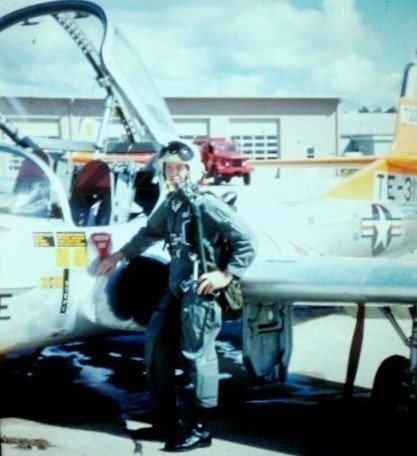BARRY R. DELPHIN, CAPT, USAF
Barry Delphin '62
Lucky Bag
From the 1962 Lucky Bag:
Barry Ronal Delphin
Clearwater, Florida
When Barry Ronal Delphin bade farewell to Cono, the Naval Academy inherited the Caesar of Clearwater. Though short in height and shorter on hair, Barry's homing dissertations on all subjects indicated his presence in any crowd. Aside from his eloquence, Barry's quick eyes, faster hands and hard spike made him a natural on the handball, tennis, and volleyball courts. After graduation Barry will again be heading South to Southern belles and Naval Aviation. The Academy's loss will be Navy Air's gain.
He was also a member of the 1st Battalion staff (winter).

Barry Ronal Delphin
Clearwater, Florida
When Barry Ronal Delphin bade farewell to Cono, the Naval Academy inherited the Caesar of Clearwater. Though short in height and shorter on hair, Barry's homing dissertations on all subjects indicated his presence in any crowd. Aside from his eloquence, Barry's quick eyes, faster hands and hard spike made him a natural on the handball, tennis, and volleyball courts. After graduation Barry will again be heading South to Southern belles and Naval Aviation. The Academy's loss will be Navy Air's gain.
He was also a member of the 1st Battalion staff (winter).
Loss & Remembrances
From Wall of Faces:
Darrel B. Couch, Major USAF Retired
19 Lynnwood Drive
Little Rock, AR 72206501-888-7282
Barry was new to our unit, 614 Tactical Fighter Squadron, Phan Rang, RVN. Barry did not deploy with our unit. He joined the unit after we were in place. We flew the F-100 Super Saber. I did not know Barry that well, but I remember the night he was killed in action in graphic detail.
It was a rare early evening for our area. Cool and calm. We leaned our chairs back against the alert shack wall and talked as we watched the sun set. We were sitting the night alert shift. I was flight lead and Barry was # 2. All alert flights were two ship. Barry talked a little about a book he was going to write about his war experience. I commented it was a nice night and would like to fly. Barry was hesitant, he did not want to fly that night.
The scramble call came late at night after we had all gone to bed. An artillery battery of the First Infantry Division was under attack and wanted an alert flight loaded with CBU-2. That was not a standard alert load, and aircraft were being loaded and a crew would have to switch planes. The command center wanted a volunteer crew, but none of the three crews on alert wanted to fly, and we were not allowed to split crews. As lead crew, Barry and I were scrambled.
Everything was uneventful until we arrived at the target. The flare ship was low on flares and could only drop one flare at a time or they would run out before we could get our strike completed. We had a middle thin cloud deck at about 7,000' and ground fog was forming. Friendly and enemy positions combined with ordnance that required a long straight through low level pass at 250', dictated all weapons delivery passes be made on the same heading. I made the first pass and had to abort due to visual problems from the fog and almost flying into the ground. I told Barry of the visual problems and cautioned him to keep instruments in his crosscheck. The forward air controller (FAC) cleared him for his first pass. He lined up and called in hot. That was his last radio call and we could not find him visually, but at night, that was not that unusual. I thought perhaps he had radio failure. I continued my pattern for my next pass. Just as I was rolling wings level, Barry crashed directly in front of my aircraft. I flew through the top of the fire ball from the crash. The NVA Battalion attacking the artillery battery must have thought we had a mid air collision for they did a frontal charge at the battery. My next CBU pass was directly on the charging line and the attack was broken, but not over. After expending all my ordnance, I passed the target to the next fighter flight. The artillery battery was saved.
The flight home was long and lonely.
Looking back, I still think my thoughts of the time are accurate. I think Barry was hit and killed in the cockpit. He tried to pull up out of the attack, and on its own, the aircraft simply did a circle back to the starting point and crashed.
I feel something else is needed here, but I simply don't have it now. I do pray he had made his peace with God.
I want to thank the VVMF for making this web site and Prodigy for pointing it out to me. For years, I have wondered and wanted to know more about Barry.
Darrel DARREL B. COUCH, [email protected], 1/3/00
Barry, 26, left behind his mother Mary Albro Delphin, his father Eugene, a brother Robin Hood, his wife Phyllis Douglas, a daughter Kletia, 3 1/2, and son Casey, 2 1/2. He was born in West Greenwich, RI, grew up in Clearwater, FL, graduating from Clearwater High School as Senior Class President. He graduated from the U.S. Naval Academy, married, and joined the Air Force. They were stationed in Big Spring Texas and Germany. While in Germany he volunteered to fly in Viet Nam. He went there in December of 1966. We corresponded regularly and he was writing the "Great American War Novel" by hand and I was typing it, sadly we only got to Chapter 3. DORIS ALBRO GRASKA, [email protected], 5/30/06
I am the son of Floyd Abney. Barry was one of my dad's very best friends and I remembered him well even though I was only 10 years old at Hahn AFB. When my dad told me Barry was shot down & killed in Vietnam, I was very sad. My dad went to Vietnam in 1969 and was fortunate enough to return home...only to die in 2002 from agent orange cancer. When attending his memorial service at Arlington, I made it a point to find Barry on the wall. Although I was young when I met him, he made a very big impression on me as a very nice and funny man. I just wanted to pass along this thought. God bless.... JOHN ABNEY, [email protected], 1/27/13
Other Information
From Heroes of the United States Naval Academy:
Barry Ronal Delphin was born April 21, 1940 in West Greenwich, Rhode Island to Eugene Garrood and Mary Albro Delphin. He grew up in Clearwater, Florida and graduated from Clearwater High School where he was class President. He was appointed to the United States Naval Academy from Florida. Midshipman Delphin graduated 596 of 789 midshipmen from the United States Naval Academy on June 6, 1962 and commissioned in the United States Air Force.
On June 7, 1962, 2nd Lieutenant Delphin married Phyllis Douglas at the United States Naval Academy, Annapolis Maryland. Together they had two children, daughter Kletia and son Casey.
2nd Lieutenant Delphin was assigned pilot training with the 3560th Pilot Training Wing at Webb Air Force Base, Big Spring, Texas.
In 1964, 1st Lieutenant Delphin was assigned to 4514th Combat Crew Training Squadron (CCTS), 4510th Combat Crew Training Squadron (CCTW) at Luke Air Force Base, Litchfield Arizona flying the F-100 Super Sabre.
1st Lieutenant Delphin made a deployment to Germany. While in Germany, he requested to fly combat missions in Vietnam.
Captain Delphin arrived in South Vietnam in December 7, 1966.
Captain Delphin was assigned to 614th Tactical Fighter Squadron, 35th Tactical Fighter Wing, 7th Air Force in Phan Rang Air Base, Republic of Vietnam.
On March 20, 1967, Captain Delphin was conducting a close air support mission near Lai Khe, north of Saigon, in his F-100D (tail number 55-2912). His aircraft was struck by automatic weapons fire and crashed before he could eject.
Captain Delphin was assigned as one of two aircraft for the night alert shift at Phan Rhang Air Base. The other pilot assigned was Major Darrel B. Couch, USAF (Ret). Captain Delphin told Couch about a book he was writing about his war experience. They were scrambled late at night after each had gone to bed. An artillery battery of the First Infantry Division was under attack and wanted an alert flight loaded with cluster bombs (CBU-2). Captain Delphin and Couch scrambled.
Everything was uneventful until they arrived at the target. The flare aircraft was low on flares and could only drop one flare at a time or they would run out before they could get the strike completed. They had a middle thin cloud deck at about 7,000 feet and ground fog was forming. Friendly and enemy positions combined with ordnance that required a long straight through low level pass at 250 feet, dictated all weapons delivery passes be made on the same heading. Couch made the first pass and had to abort due to visual problems from the fog and almost flying into the ground. Couch told Delphin of the visual problems and cautioned him to keep instruments in his crosscheck. The forward air controller (FAC) cleared Delphin for his first pass. He lined up and called in hot. That was his last radio call and they could not see him visually, but at night, that was not that unusual. Couch thought perhaps Delphin had radio failure. Couch continued his pattern for his next pass. Just as Couch was rolling wings level, Dolphin crashed directly in front of his aircraft. Couch flew through the top of the fire ball from the crash. The NVA Battalion attacking the artillery battery must have thought they had a mid-air collision for they did a frontal charge at the battery. Couch’s next CBU pass was directly on the charging line and the attack was broken, but not over. After expending all his ordnance, Couch passed the target to the next fighter flight. Although Captain Delphin was killed their mission was successful as the artillery battery was saved.
He has a memorial in Florida.
Photographs
Class President Clearwater High School Yearbook; via Heroes of the United States Naval Academy
Cropped group photo of the 4514th CCTS, 4510th CCTW, Luke AFB, early 1964; via Heroes of the United States Naval Academy
Silver Star
From Home of Heroes:
Synopsis:
The President of the United States takes Pride in presenting the Silver Star Medal (Posthumously) to Barry Ronal Delphin (63798), Captain, U.S. Air Force, for conspicuous gallantry and intrepidity in action against a hostile force during an air mission in the Republic of Vietnam. Captain Delphin distinguished himself by intrepid actions on while serving with 614th Tactical Fighter Squadron, 35th Tactical Fighter Wing, 7th Air Force. His unquestionable valor in close combat is in keeping with the highest traditions of the military service and reflects great credit upon himself, the 7th Air Force, and the United States Air Force.
Home Town: Clearwater, Florida

The "category" links below lead to lists of related Honorees; use them to explore further the service and sacrifice of alumni in Memorial Hall.




